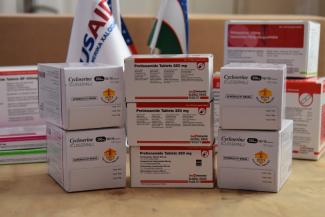In a country with a high burden of multidrug-resistant tuberculosis (MDR-TB),[1] the Government of Uzbekistan is keenly aware of the need for continuous access to quality-assured medicines to treat TB. As a national medicines regulatory authority (NMRA), Uzbekistan’s State Center for Expertise and Standardization of Medicines, Medical Devices, and Medical Equipment is an essential component for making quality medicines available to the public in a timely manner. The State Center carries out the medicines registration process, which systematically ensures that all medicines meet national standards in efficacy, safety, quality, and clinical use information.
Although the State Center had made significant progress in its operations, the registrations process was not optimally streamlined, resulting in delays for critical TB medicines to reach patients with TB and MDR-TB.
Meanwhile, the Government of Uzbekistan is transitioning from financial support from the Global Fund Against AIDS, TB, and Malaria (the Global Fund) to directly procuring first-line TB medicines. To ensure that TB patients have access to medicines that meet international quality standards, the government decided to continue procuring quality-assured, first-line TB medicines with domestic funding from the Global Drug Facility (GDF). The TB medicines from the GDF are also prequalified by the World Health Organization (WHO), a process that assesses the quality, safety, and efficacy of medicinal products.[2] However, these WHO-prequalified medicines also need to be registered in the country before becoming available on the market.
The Promoting the Quality of Medicines Plus (PQM+) Program, funded by the U.S. Agency for International Development (USAID) and implemented by U.S. Pharmacopeia (USP), has been supporting the State Center and the Ministry of Health (MOH) in strengthening the country’s medicines registration system. PQM+ advocated that the State Center operationalize the WHO’s collaborative procedure for accelerated registration (CRP) of WHO-prequalified medicines. This procedure accelerates the registration process for WHO-prequalified medicines by using prior assessment and inspection information for those medicines, rather than the State Center repeating this process. In doing so, the State Center and other NMRAs using this procedure eliminate duplicative regulatory work, removing a step in the medicines registration process and ultimately speeding up the process. In addition to its advocacy, PQM+ helped strengthen the State Center’s organizational capacity to implement WHO CRP. This included developing an internal procedure to review and approve dossiers of WHO-prequalified medicines in the country and a corresponding guideline for manufacturers.
In August 2021, the MOH approved an order to reduce costs to register WHO-prequalified TB medicines. The order decreased the registration fee nearly in half, from $10,000 to $5,390. PQM+ facilitated an orientation to the WHO procedure in Uzbekistan for interested manufacturers and worked with GDF and NTP to encourage manufacturers of WHO-prequalified products to apply for registration through the WHO procedure in Uzbekistan. PQM+ also coordinated with the State Center, National TB Program and GDF, to ensure engagement with prequalified medicines manufacturers, timely submissions, and dossier reviews.
“USAID is proud to support the Government of Uzbekistan’s efforts to combat TB. Accelerating the registration of TB medicines in Uzbekistan also benefits other areas of the health system and will increase access to safe, effective medicines,” Cherry Gumapas, Director of USAID’s Health Office in Uzbekistan, said in a statement from the U.S. Embassy in Tashkent.[3]
In December 2021, the State Center successfully registered two WHO-prequalified MDR-TB medicines, cycloserine and prothionamide, using WHO CRP. In the following months, four additional TB medicines received approval, confirming a more efficient registration process. Through this activity, the State Center has acquired the organizational capacity to use the WHO procedure—not only for registering TB medicines, but for other WHO-prequalified essential medicines as well.
Utilizing WHO CRP benefits people in Uzbekistan by giving them access to quality-assured medicines for TB and other conditions, and making the medicines available more quickly, to eventually achieve desired health outcomes. Through WHO CRP, manufacturers can expedite the registration process for their WHO-prequalified medicines. The reduced registration fee also incentivizes manufacturers to apply.
PQM+ continues to work with the State Center and other stakeholders to further build regulatory capacity and provide the necessary technical support in medicines registration and other areas so that the people in Uzbekistan have increased access to quality-assured medicines.
[1] https://tbfacts.org/high-burden-tb/
[2] https://www.who.int/news-room/fact-sheets/detail/prequalification-of-medicines-by-who
[3] https://uz.usembassy.gov/usaid-facilitates-access-to-six-tuberculosis-medicines-in-uzbekistan/


